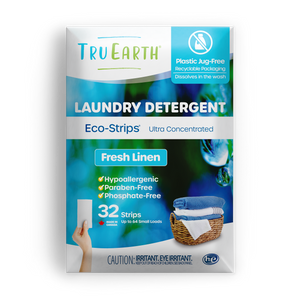Synthetic fragrances may make cleaning products smell amazing, but they come with potential dangers that are often overlooked. These artificial scents can cause a host of health problems, including headaches, allergies, respiratory issues, and even hormone disruption.
It's no wonder that people are becoming more aware of the potentially harmful ingredients in cleaning products and are challenging manufacturers to provide safer and more natural options. In this article, we will explore the dangers of synthetic fragrances in cleaning products and what you can do to protect your health and that of your family.

Fragrances Are Linked to an Alarming Number of Health Risks
It's important to be aware of the dangers of fragrances in our daily lives. Studies have found that the chemical compounds used to create these pleasing scents can have serious health risks. Many of these compounds are classified as allergens, which can cause reactions in people with sensitive skin or respiratory issues.
Fragrances have also been identified as hormone disruptors, meaning they can interfere with the proper function of hormones in our bodies. This is especially concerning for pregnant women and children, as hormonal changes during development are critical for proper growth and development.
In addition, fragrances can trigger asthma attacks and other respiratory issues, making them a danger to individuals with preexisting conditions. Perhaps most alarmingly, some of the chemicals used in fragrances are classified as neurotoxins and carcinogens, meaning they can cause damage to our nervous systems and increase the risk of cancer.
It's clear that fragrances are more than just a pleasant addition to our personal care and cleaning products - they can have serious health consequences. By being informed and choosing products without added fragrances and using non-toxic products, we can protect ourselves and our loved ones from these risks.
Fragrances Commonly Contain Phthalates
Phthalates are common chemicals used in fragrances to make the scents last longer. However, their health risks are alarming and pose a serious threat to human health. Exposure to phthalates can lead to significant health problems, including cancer, reproductive and developmental toxicity, endocrine disruption, birth defects, and respiratory issues.
Unfortunately, avoiding phthalates can be difficult because manufacturers are not required to list them on product labels. This means that consumers have no way of knowing whether or not they are being exposed to these toxic villains.
As a result, it is essential to be vigilant and do research on the fragrances you use to ensure that they do not contain phthalates. In addition, look for products that are labeled as phthalate-free to reduce your risk of exposure.
Fragrance-Free” or “Unscented” Isn’t Always Safe
When it comes to skincare, many people opt for products that are labeled as "fragrance-free" or "unscented" in order to avoid harsh synthetic fragrances that can cause skin irritation. However, it's important to note that not all products labeled as such are actually free of fragrances. In fact, some manufacturers may use masking fragrances to cover up the chemical smell of their product, which can still cause irritation in sensitive individuals.

To ensure that you are truly using a fragrance-free or unscented product, it's essential to check the ingredient list carefully. Look for products that list "fragrance" or "perfume" as an ingredient, as these are usually synthetic fragrances that can cause skin reactions. If you see these on the list, it's best to avoid the product altogether.
On the other hand, if a product lists natural essential oils as an ingredient, it may still be safe for sensitive skin. However, it's important to note that even natural fragrances can still cause irritation in some people. If you have particularly sensitive skin, it's best to stick with products that are labeled as fragrance-free and have minimal ingredients.
In summary, while "fragrance-free" and "unscented" labels can be helpful in avoiding synthetic fragrances, it's important to do your own research and check the ingredient list to ensure that a product is truly free of fragrances. Read the labels carefully and prioritize products with natural ingredients if possible, and always listen to your skin if it is showing signs of irritation or discomfort.
Clean Doesn’t Have a Smell
Did you know that fragrance chemicals in your cleaning products, deodorants, shampoo or laundry detergent are only there to create a perception of cleanliness? In reality, these chemicals are not making your products work better.
It has become ingrained in our minds that a clean environment has a specific scent, when actually that is not the case. In fact, some fragrances have been linked to causing health problems such as allergies, migraines, and skin irritation.
The use of unscented products can not only reduce the risk of health problems but also be beneficial to those who work in scent-free environments such as hospitals and workplaces. So the next time you are purchasing a product, consider if its fragrance is necessary or if it is simply an unnecessary addition.
Why Choose Eco-Friendly Cleaning Products?
When it comes to keeping our homes clean and sanitary, we often don't think about the impact our cleaning products have on the environment. However, the truth is that many cleaning products come in plastic containers that ultimately end up in landfills.

In fact, did you know that 2.5 billion plastic cleaning bottles end up in landfills each year? That's a staggering amount of waste! But there is a solution - eco-friendly cleaning products like Tru Earth's multi-purpose cleaner.
This product is not only effective at killing 99% of bacteria, fungi, and viruses, but it also comes in a biodegradable cardboard sleeve, which keeps plastic out of landfills. By choosing Tru Earth, you can feel good knowing that each time you use it, you're making a small but meaningful effort to reduce plastic waste.


